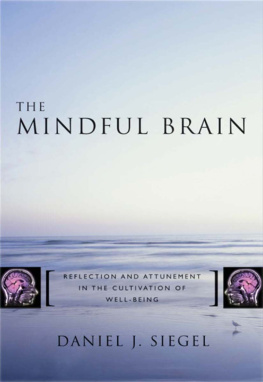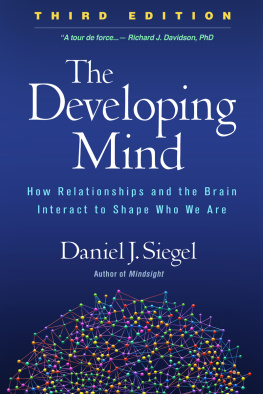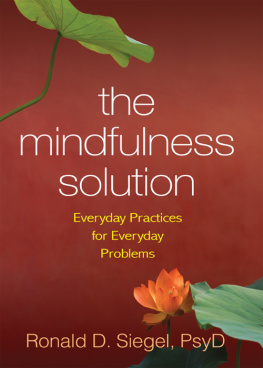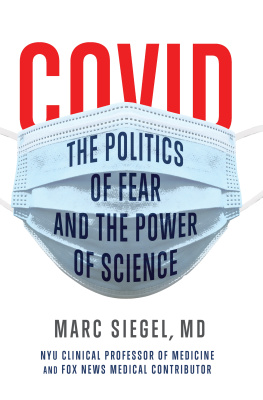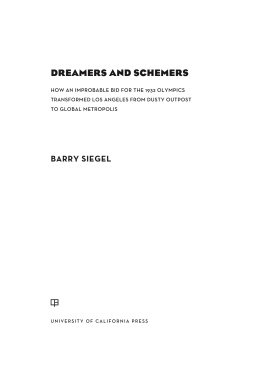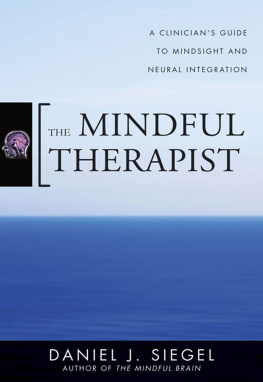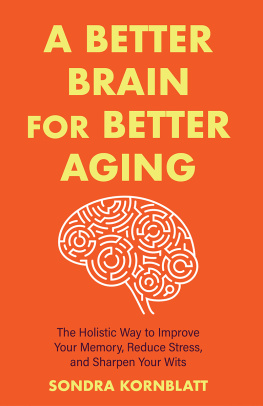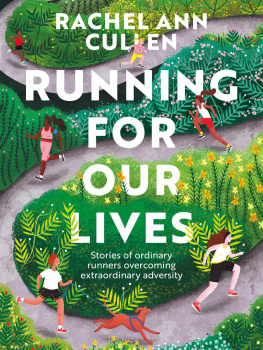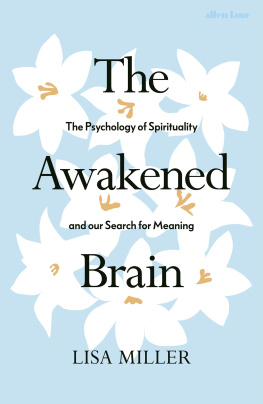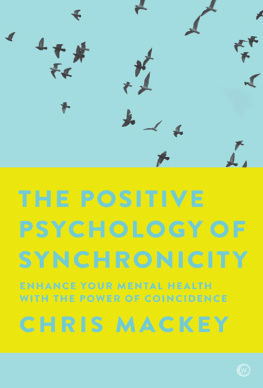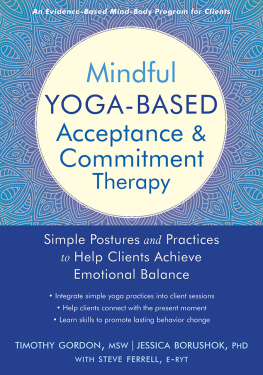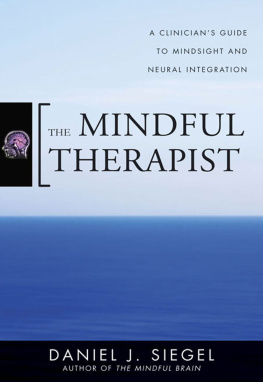DANIEL J. SIEGEL
W. W. NORTON & COMPANY
All illustrations are the property of the author, unless noted otherwise. To contact the author, please visit mindsightinstitute.com. The Mindful Brain is a trademark of Mind Your Brain, Inc.
Copyright 2007 by Mind Your Brain, Inc.
For information about permission to reproduce selections from this book, write to Permissions, W. W. Norton & Company, Inc., 500 Fifth Avenue, New York, NY 10110
The mindful brain: reflection and attunement in the cultivation of well-being / Daniel J. Siegel.1st ed.
p. cm.
Includes bibliographical references.
1. Psychophysiology. 2. Awareness. I. Title.
[DNLM: 1. Psychophysiology. 2. Brainphysiology. 3. Mind-Body Relations (Metaphysics) 4. Mind-Body and Relaxation Techniques. WL 103 S5712m 2007]
W. W. Norton & Company, Inc., 500 Fifth Avenue, New York, N.Y. 10110
www.wwnorton.com
W. W. Norton & Company Ltd., Castle House, 75/76 Wells St., London W1T 3QT
ACKNOWLEDGMENTS
W ords cannot fully express the gratitude I feel toward the many people along this journey to explore the mind and understand mindfulness. My colleagues at the UCLA Mindful Awareness Research Center, including Sue Smalley, Lidia Zylowska, Sigi Hale, Shea Cunningham, Deborah Ackerman, David Creswell, Jonas Kaplan, Nancy Lynn Horton, Diana Winston, and others, have been a great source of inspiration and learning. Peter Whybrow, our director at the Semel Institute for Neuroscience and Human Behavior, has been of great support in bringing mindfulness into that academic setting. At the Foundation for Psychocultural Research (FPR)/UCLA Center for Culture, Brain, and Development, I am fortunate to be a part of a team of scholars dedicated to crossing the usual boundaries separating disciplines and am thankful to Robert Lemelson of the FPR and to my co-principal investigators there, Patricia Greenfield, Mirella Dapretto, Alan Fiske, and John Schuman, for our ongoing collaboration. Marco Iacoboni has also been a fabulous colleague with whom I have been able to share clinical ideas about the mirror neuron system and collaborate on educational programs for therapists in this emerging area.
At the Mindsight Institute, Erica Ellis has been extremely helpful in administering our educational program and working closely with me on finalizing the references and copyedited text. Those fellow therapists who study interpersonal neurobiology with me at the Institute are a continual source of intellectual stimulation and challenge, and they have been an important sounding board in helping to translate these intricate ideas about the mindful brain into an accessible and hopefully useful form for others. I am especially thankful for the collaboration of the members of GAINS, the Global Association for Interpersonal Neurobiology Studies.
I appreciate the ongoing professional collaboration with Allan Schore and Lou Cozolino, and I thank Lou for his permission to use the wonderful drawings of the brain from his excellent book, The Neuroscience of Human Relationships (2006). MAWS & Company created the artwork for Figures 4.1, 4.2, 4.3, 6.1, and 14.1, and I am grateful for how clearly those drawings are able to express my ideas about mindful awareness.
A vital source of inspiration are my patients, whose courage to face the direct experience of memory and emotion, of trying to find a way beneath the restrictive personal identities that have enslaved them for so long, continues to give meaning to my professional life in these many years of practice.
As this exploration of mindfulness has unfolded, Rich Simon organized a meeting at his annual Networker Symposium gathering in which he brought together Diane Ackerman, Jon Kabat-Zinn, John ODonohue, and me. It was love at first insight, and the varied relationships among each of us has continued to grow in marvelous ways. Our Mind and Moment meeting in February, 2006 was a pinnacle of my educational journey, and I am profoundly grateful to Diane, Jon, and OJohn for our time together.
In learning about mindfulness, Jon Kabat-Zinn encouraged me to dive deeply into direct experience and guided me to the Mind and Life Institutes gathering of scientists to sense first-hand a week of silence. Im grateful for his suggestions and appreciative of Adam Engle, chair of the Mind and Life Institute, and to Joseph Goldstein and Sharon Salzberg and the other faculty of the Insight Meditation Society who hosted that transformative event.
In the writing of the book itself, it has been extremely helpful to have the insightful comments from a number of individuals who read earlier drafts and gave important feedback on the voice of the book itself. These individuals include Diane Ackerman, Erica Ellis, Bonnie Mark Goldstein, Daniel Goleman, Susan Kaiser-Greenland, Jack Kornfield, Lynn Kutler, Rich Simon, Marion Solomon, and Caroline Welch.
Rich Simon not only read this and other manuscripts of mine, but he has served as a comrade-in-arms in facing the challenging task of writing a first-person account for a professional audience while at the same time exploring the science of the mind with rigor and clarity. He is both a social feng shui master, as the experience of his now thirty years of running the Psychotherapy Networker reveals, as well as a brilliant editor with vision for the larger issues between and beyond the lines of the text. I thank him for his vital support.
I was very fortunate to be able to rely on a number of individuals expertise on mindfulness and on the brain to check on various details of the science and explorations in the book. Jack Kornfield and Dan Goleman made helpful clarifications and I thank them for their thoughtful comments on the text. Ellen Langer was a pleasure to engage with in examining ideas about mindful learning and mindful awareness. I am grateful for her insights and her willingness to take the time to go over a wide array of issues in our discussions. Richard Davidson was also of great support in reviewing certain aspects of brain research as they relate to his important contributions in the emerging field of contemplative neuroscience. His wisdom and kindness are greatly appreciated.
I am also deeply appreciative of David Creswell, Susan Kaiser-Greenland, Sara Lazar, and Lidia Zylowska for sharing their unpublished research data with me to include in this text. Their genorosity has enabled this theoretical synthesis and conceptual integration about the relational nature of the mindful brain to offer cutting-edge knowledge in this exciting field.
Id also like to thank Andrea Costella and Deborah Malmud for shepherding this unusual project with professional perseverance. This book is not a typical text in that it synthesizes deep personal experience with scientific analysis. I am grateful that they supported the project and helped it come to life. Deborah Malmud has also been a pleasure to work with in my capacity as the Series Editor for the Norton Series on Interpersonal Neurobiology, and I am grateful for her clear thinking about how to bring this emerging interdisciplinary view into the academic, professional, and public worlds.
Finally, I would like to thank my wife and children for their never-ending support of my whacky ways and my passion for this work. I feel deeply grateful to watch the reflective emergence of my two adolescents who continually challenge me to be fully present in our lives. I have been fortunate to be able to explore these evolving ideas regularly with my wife who has taught me so much about mindfulness. Her insights have been extremely helpful in trying to make the mindful brain come alive on these pages.

